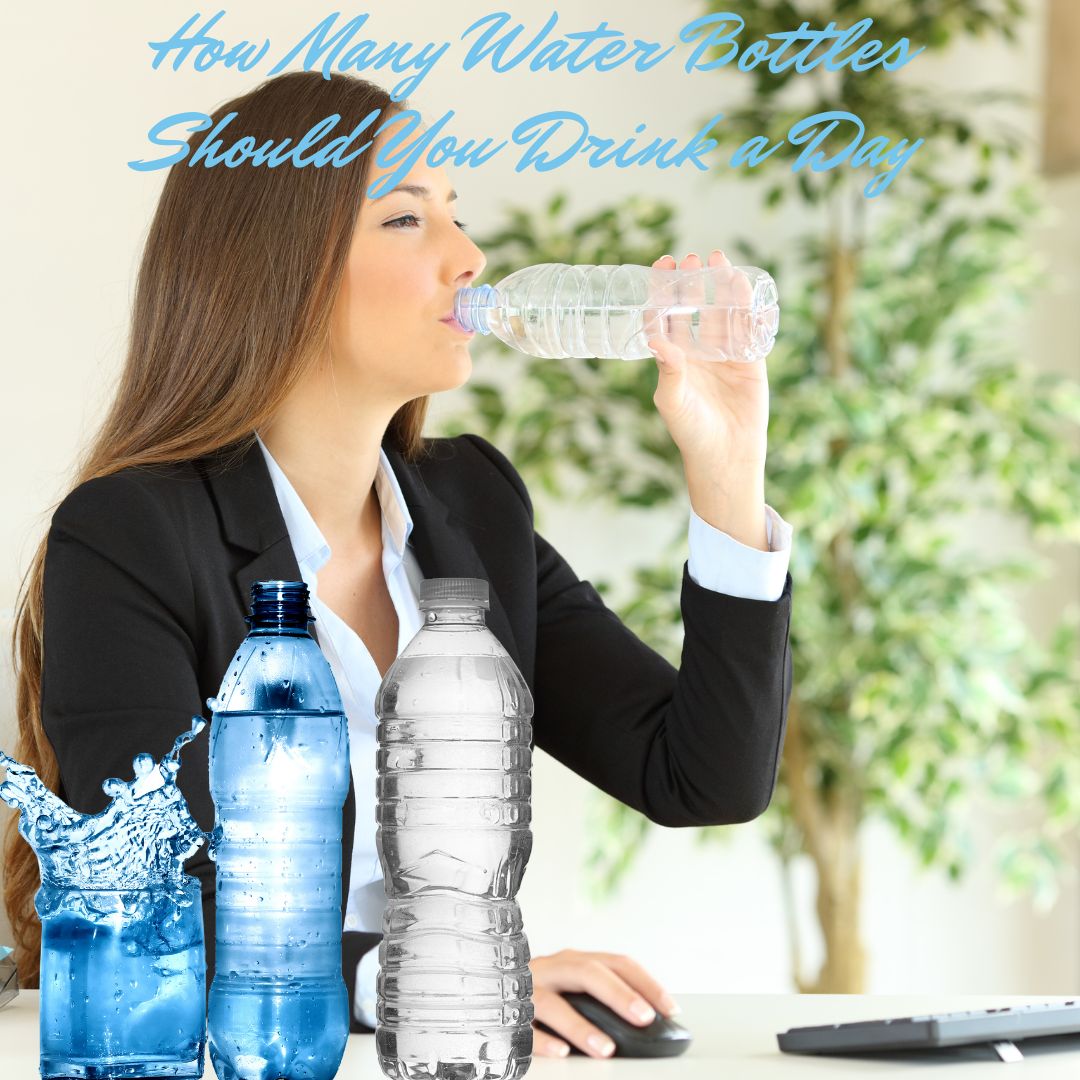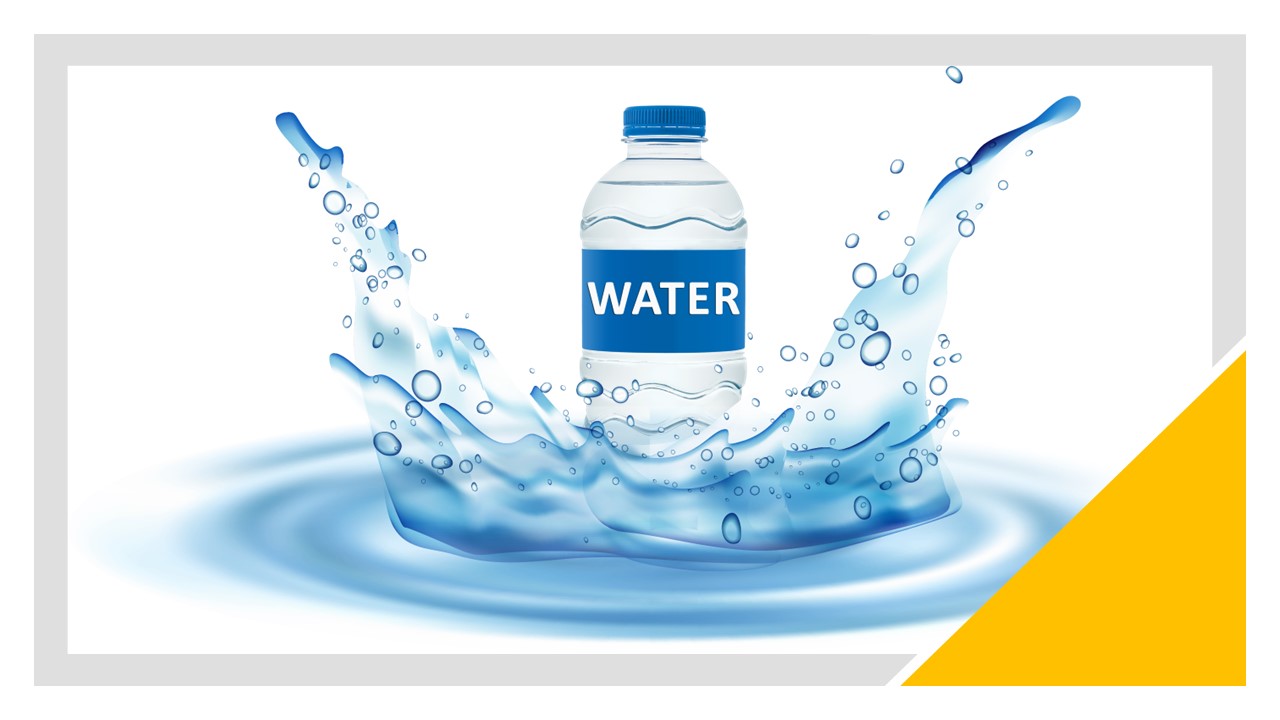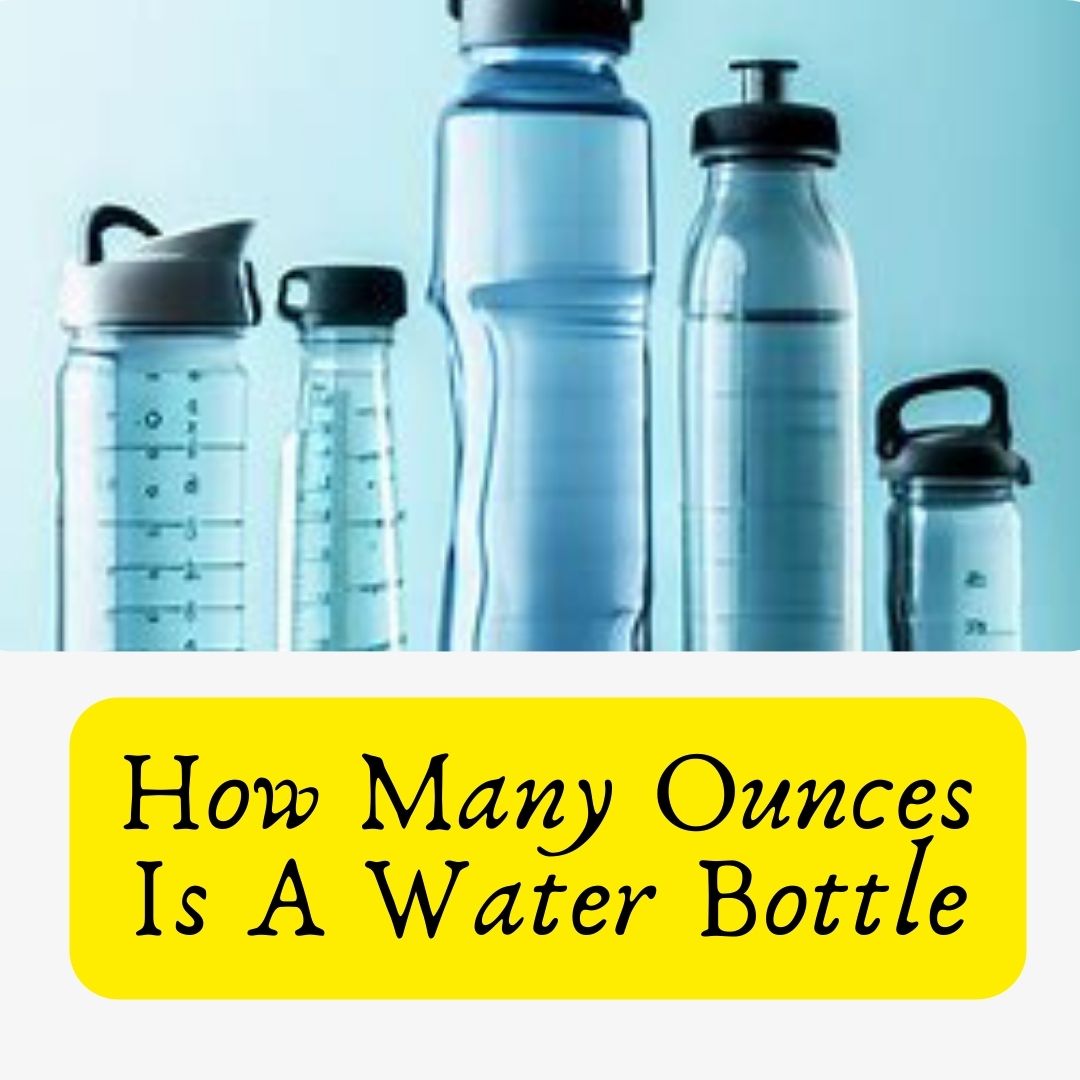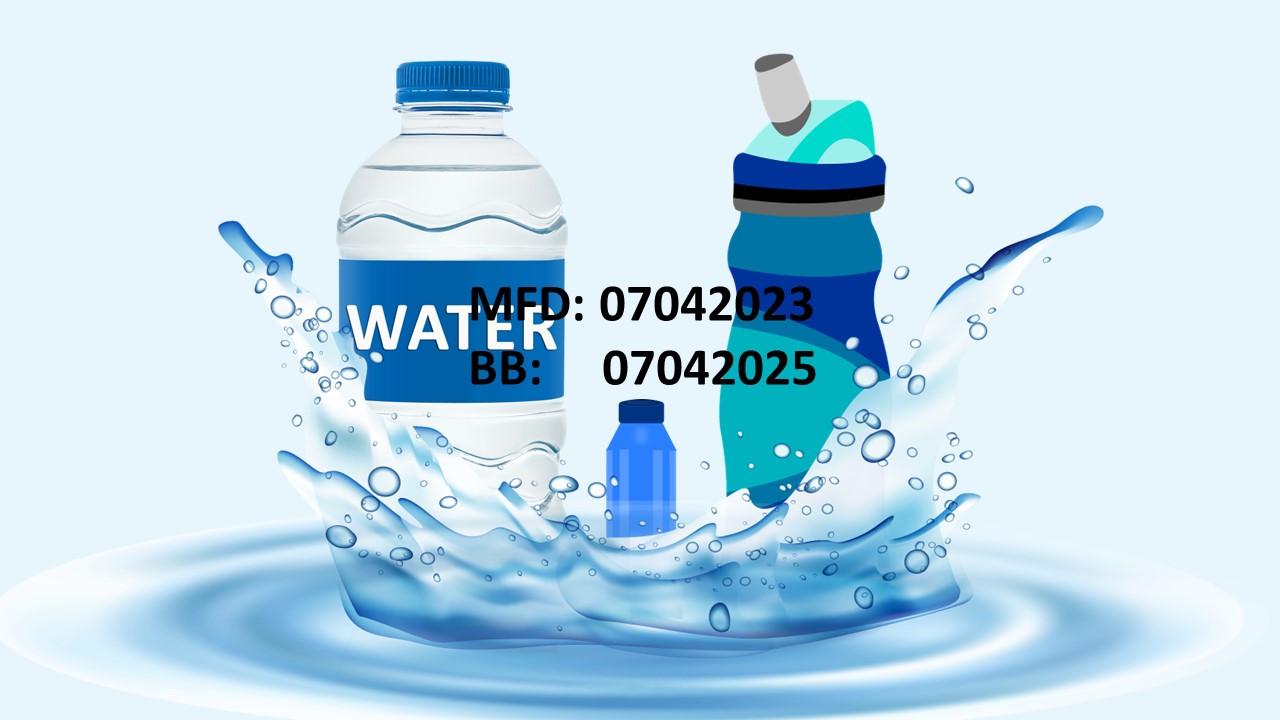Water Bottles Sizes: Unlocking The Perfect Water Bottle Size For Your Every Adventure
Water is the elixir of life and staying hydrated throughout the day is vital for our overall well-being. One of the most convenient ways to quench our thirst on the go is by using reusable water bottles which are available in different water bottle sizes including 8 oz, 12 oz, 16 oz, 20 oz, 24 oz, 32 oz, 40 oz and 64 oz.
Did you know that the average adult should consume about eight 8-ounce glasses of water per day? Research has shown that maintaining proper hydration levels can have numerous benefits, from supporting digestion and regulating body temperature to promoting cognitive function and boosting energy levels.
Within the vast landscape of water bottle sizes, we will delve into the intricacies and explore the options available to you. From petite 8-ounce companions perfect for kids to larger 64-ounce giants ready to accompany you on hiking expeditions, we will discuss the characteristics, use cases, and benefits of each size.
Water Bottle Sizes
In a world where staying hydrated is paramount, the search for the perfect water bottle size has become an adventure in itself. Every sip count, whether you’re conquering a mountain peak, crushing your workout, or simply navigating the demands of everyday life.
Water bottles come in a diverse range of sizes, catering to various needs and activities. Let’s explore some of the commonly available capacities and understand how different sizes can enhance your hydration experience.
1. 8 oz: Kids Water Bottle Sizes
An 8 oz water bottle is a compact and convenient option for on-the-go hydration. While smaller in size, it still offers sufficient capacity to keep your kid refreshed throughout the day. Here’s an overview of the 8 oz water bottle:
- The compact size of an 8 oz water bottle makes it highly portable. It easily fits into kids’ backpacks, purses, or cup holders, allowing them to carry it with ease wherever they go. Its lightweight design makes it ideal for kids.
- An 8 oz water bottle is perfect for everyday use. It provides a convenient and accessible source of hydration, ensuring you can quench your thirst whenever needed.
- The 8 oz size is often preferred for children due to its manageable capacity. It allows for controlled portions, making it easier for kids to handle and drink from independently. It’s an ideal choice for school lunches, outings, or sports activities.
- An 8 oz water bottle can assist with portion control, helping you monitor and track your water intake. It can be particularly beneficial for those who prefer to regulate their hydration throughout the day or are following specific dietary or fitness plans.
2. 12 oz: Compact and Portable
- The 12 oz water bottle is the epitome of convenience and portability. It’s perfect for short outings, commuting, or slipping into your bag.
- Ideal for individuals who prefer sipping water in smaller quantities or those who want a lightweight option for easy carrying.
3. 16 oz: Versatile Everyday Companion
- The 16 oz water bottle strikes a balance between portability and capacity, making it a versatile choice for daily use.
- Suitable for activities like going to the gym, running errands, or keeping you hydrated at work or school.
- Offers a bit more hydration capacity than the 12 oz option while remaining manageable in terms of size and weight.
4. 20 oz: Active Lifestyle Essential
- The 20 oz water bottle is a popular choice for those with an active lifestyle, including athletes, hikers, and outdoor enthusiasts.
- Provides an ample amount of hydration to keep you going during workouts, hikes, or extended outdoor adventures.
- Strikes a good balance between size and capacity, allowing you to carry a substantial amount of water without it becoming burdensome.
5. 24 oz: Hydration On-The-Go
- The 24 oz water bottle is designed for individuals who require a generous amount of hydration throughout the day.
- Perfect for longer trips, day excursions, or intense physical activities that demand sustained hydration.
- Offers a significant capacity while still being manageable and easily fitting into most backpacks or cup holders.
6. Larger Options (32 oz and beyond): High Volume Hydration
- For those who require substantial hydration or want to minimize refills, larger water bottles are the way to go.
- Sizes like 32 oz, 40 oz, or even 64 oz cater to individuals engaged in intense workouts, extended outdoor adventures, or those who simply prefer carrying larger volumes of water.
- These sizes are especially beneficial in situations where access to refilling stations might be limited.
Remember, the ideal water bottle size depends on your personal preferences, daily activities, and hydration needs. Consider factors such as how frequently you’ll be using the bottle, the duration of your activities, and your personal comfort in carrying different sizes.
By choosing the right water bottle size, you ensure that you have an adequate supply of water at hand, keeping you hydrated and performing at your best throughout the day.
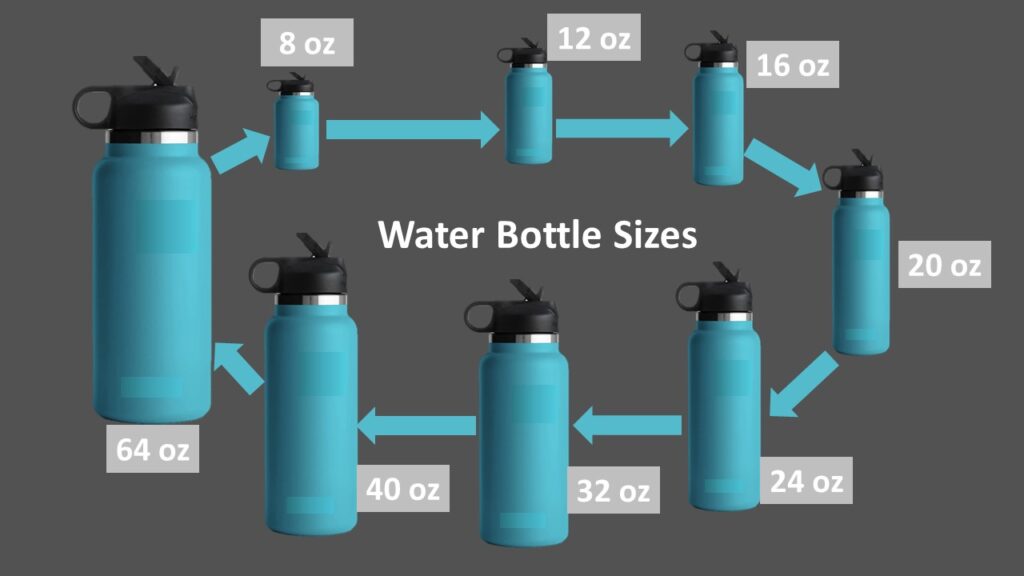
Features And Benefits Of Water Bottle Sizes
Each water bottle size offers its own set of features and benefits, catering to various preferences and lifestyles. Let’s explore the key aspects and advantages of different sizes:
1. Smaller Bottles (8-16 oz)
- Portability: Smaller bottles are highly portable and easily fit into backpacks, or cup holders, making them convenient for on-the-go hydration.
- Lightweight: These bottles are generally lightweight, minimizing the burden of carrying them during daily activities or short outings.
- Quick Refills: Smaller sizes require more frequent refills, but they allow you to change up your beverage or keep it fresh throughout the day.
- Easy Cleaning: Cleaning smaller bottles is often a breeze, as their compact size allows for easy access and efficient rinsing.
2. Medium-Sized Bottles (20-24 oz)
- Versatile Capacity: Medium-sized bottles strike a balance between capacity and portability, providing enough water for extended activities without being too bulky to carry.
- Enhanced Durability: Many medium-sized bottles are designed with durable materials, ensuring they can withstand the rigors of sports activities or outdoor adventures.
- Insulation Options: Some medium-sized bottles offer insulation properties, keeping your beverages cool or hot for longer periods, making them suitable for both hot and cold drinks.
- Easy Handling: The size of medium bottles offers a comfortable grip and easy handling during workouts or outdoor activities.
3. Larger Bottles (32 oz and beyond)
- Extended Hydration: Larger bottles accommodate a higher volume of water, reducing the need for frequent refills during long workouts, outdoor excursions, or trips.
- Convenience in High Demand Situations: These sizes are especially beneficial in situations where access to refilling stations might be limited, providing sustained hydration throughout the day.
- Enhanced Insulation: Many larger bottles come with superior insulation properties, keeping your beverages at the desired temperature for extended periods, making them suitable for all-day activities.
- Durable Construction: Larger bottles are often built with robust materials to withstand rugged environments and ensure long-lasting durability.
Considerations and Recommendations For Water Bottle Sizes
When selecting a water bottle size, it’s essential to consider several factors that will help you make an informed decision based on your specific needs and preferences. Here are some key considerations and corresponding recommendations to guide you:
1. Hydration Needs
Evaluate your daily hydration requirements. Consider how much water you typically consume throughout the day to ensure your chosen bottle size can meet your hydration needs.
Recommendation
If you require a higher intake of water or engage in activities that demand more hydration, opt for medium to larger-sized bottles (20 oz and above). If your hydration needs are relatively modest, smaller bottles (12-16 oz) may suffice.
2. Refilling Frequency
Assess the convenience of refilling. Consider how often you have access to clean water sources or refilling stations during your activities.
Recommendation
If you prefer fewer refills or engage in activities where refilling opportunities are limited, larger-sized bottles (32 oz and beyond) will minimize the need for frequent refills. For situations where refilling is readily available, smaller or medium-sized bottles (12-24 oz) can be suitable.
3. Space Constraints
Evaluate your storage options. Consider the available space in your bag, backpack, or cup holder where you plan to carry your water bottle.
Recommendation
If you have limited space or prefer a compact option, smaller bottles (8-16 oz) are more likely to fit comfortably. Medium-sized bottles (20-24 oz) strike a balance between capacity and portability, while larger bottles (32 oz and beyond) require more space but offer higher volume.
4. Intended Use and Activities
Identify the primary purpose of your water bottle. Consider the specific activities or environments where you’ll use the bottle, such as sports, camping, office, or everyday carry.
Recommendation
For activities like sports or intense workouts, medium-sized bottles (20-24 oz) provide a good balance of capacity and portability. If you’re engaging in longer outdoor adventures or require sustained hydration, larger bottles (32 oz and beyond) are recommended.
Smaller bottles (12-16 oz) are suitable for everyday carry, office use, or short outings.
Comparisons And Reviews Of Water Bottle Sizes
To provide you with a comprehensive overview, let’s compare popular water bottle brands or models within each size category. The table below summarizes customer reviews, ratings, and notable features that make each option stand out.
Smaller Bottles (12-16 oz)
| Brand/Model | Customer Reviews | Ratings | Notable Features |
| Hydro Flask 12 oz | Excellent insulation, durable build | 4.8/5 | Double-wall vacuum insulation, BPA-free |
| Nalgene 16 oz | Wide mouth for easy cleaning and filling | 4.6/5 | BPA-free, leakproof, durable construction |
| CamelBak 16 oz | Flip-top lid, spill-proof design | 4.5/5 | BPA-free, dishwasher-safe, convenient carry handle |
Medium-Sized Bottles (20-24 oz)
| Brand/Model | Customer Reviews | Ratings | Notable Features |
| Yeti Rambler 20 oz | Excellent insulation, rugged construction | 4.7/5 | Double-wall vacuum insulation, leakproof, durable |
| Contigo Autoseal 24 oz | One-handed operation, spill-proof design | 4.5/5 | Autoseal lid, BPA-free, easy to clean, carry handle |
| Klean Kanteen 20 oz | Wide mouth for easy filling and cleaning | 4.6/5 | Stainless steel, leakproof, BPA-free, durable |
Larger Bottles (32 oz and beyond)
| Brand/Model | Customer Reviews | Ratings | Notable Features |
| Hydro Flask 32 oz | Excellent insulation, durable build | 4.8/5 | Wide mouth opening, BPA-free, double-wall insulation |
| Nalgene 32 oz | Sturdy construction, easy to clean and carry | 4.7/5 | BPA-free, leakproof, durable, wide mouth |
| Yeti Rambler 36 oz | Superior insulation, rugged design | 4.6/5 | Double-wall vacuum insulation, durable construction |
Buying Guide And Recommendations For Water Bottle Sizes
When it comes to choosing the right water bottle size, consider the following buying guide to help you make an informed decision based on your specific needs and preferences:
Everyday Carry and Short Outings
- Recommended Size: Smaller bottles (12-16 oz)
- These sizes are perfect for carrying in purses, backpacks, or briefcases during your daily activities and short outings.
- Recommendation: Check out the IRON Flask 12 oz for a compact and durable option.
Sports and Fitness
- Recommended Size: Medium-sized bottles (20-24 oz)
- These sizes strike a balance between capacity and portability, providing enough hydration during workouts, gym sessions, or sports activities.
- Recommendation: Consider the 4 Ocean Water Bottle 20 oz for its excellent insulation and rugged construction.
Outdoor Adventures and Travel
- Recommended Size: Larger bottles (32 oz and beyond)
- These sizes offer extended hydration for outdoor activities, camping, or travel, especially when access to refilling stations may be limited.
- Recommendation: Explore the Takeya 32 oz with its wide mouth opening and double-wall insulation.
Remember to consider factors such as your daily hydration needs, the frequency of refilling, space constraints, and the intended use when selecting a water bottle size.
For purchasing water bottles, you can explore reputable online retailers or visit physical stores. Here are some affiliate recommendations for reliable online retailers:
- Hydro Flask: Offers a wide range of water bottles in different sizes with durable construction and insulation properties.
- Yeti: Known for their rugged and durable water bottles designed for outdoor adventures and sports.
- CamelBak: Provides a variety of water bottles from different brands, catering to various sizes and preferences.
The Recommended Daily Water Intake For Adults And Children (Water Bottle Sizes)
Here is the recommended Daily Water Intake:
- Adults: The recommended daily water intake for adults can vary based on factors such as age, gender, activity level, and climate. In general, health authorities suggest a daily intake of about 2 to 3 liters (or approximately 8 to 12 cups) of water for men and 2 to 2.7 liters (or about 8 to 11 cups) for women. This includes water from all sources, including beverages and food.
- Children: The recommended daily water intake for children depends on their age, size, activity level, and environmental conditions. As a general guideline, the American Academy of Pediatrics suggests the following daily water intake for children:
- 1-3 years: 1.3 liters (or about 4 cups)
- 4-8 years: 1.7 liters (or approximately 5-6 cups)
- 9-13 years: 2.4 liters (or around 8-9 cups) for boys and 2.1 liters (or about 7-8 cups) for girls
It’s important to note that these are general recommendations, and individual water needs may vary. Factors such as physical activity, climate, and overall health should be considered when determining personal hydration requirements.
Additionally, some health conditions or medications may necessitate adjustments to water intake, so it’s always advisable to consult with a healthcare professional for personalized guidance.
Tips For Staying Hydrated Throughout The Day (Water Bottle Sizes)
Staying hydrated throughout the day is essential for maintaining optimal health and well-being. Here are some tips to help you stay hydrated:
- Carry a Water Bottle: Keep a reusable water bottle with you at all times. Having water readily available will encourage you to drink more frequently.
- Set Reminders: Use reminders on your phone or computer to prompt yourself to drink water regularly. Setting specific intervals can help you establish a hydration routine.
- Infuse Your Water: Add flavor to your water by infusing it with fruits, herbs, or even cucumber slices. Infused water can be a refreshing and tasty alternative to plain water, making hydration more enjoyable.
- Monitor Your Urine Color: Pay attention to the color of your urine. If it’s pale yellow or clear, it indicates that you’re adequately hydrated. Darker urine may be a sign of dehydration, so increase your water intake.
- Eat Hydrating Foods: Incorporate foods with high water content into your diet, such as fruits (watermelon, oranges), vegetables (cucumbers, tomatoes), and soups. These foods can contribute to your overall hydration.
- Drink Before Meals: Have a glass of water before each meal. It not only helps with hydration but can also assist with portion control and digestion.
- Keep Water Visible: Keep a water bottle on your desk, kitchen counter, or other easily visible spots to serve as a reminder to drink water.
- Hydrate During Physical Activity: Drink water before, during, and after physical activity to replenish fluids lost through sweating.
- Limit Caffeine and Alcohol: Both caffeine and alcohol can contribute to dehydration. Consume them in moderation and balance their intake with increased water consumption.
- Listen to Your Body: Pay attention to your body’s signals of thirst and drink water when you feel thirsty. Don’t ignore the signs of dehydration.
The Importance Of Drinking Water For Overall Health And Well-Being (Water Bottle Sizes)
Drinking water is crucial for maintaining overall health and well-being. Here are the key reasons why water is essential for our bodies:
- Hydration: Water is the fundamental building block of our bodies. It plays a vital role in regulating body temperature, lubricating joints, protecting organs, and aiding in digestion. Proper hydration is essential for the optimal functioning of all bodily systems.
- Nutrient Absorption: Water helps transport nutrients and oxygen to cells, enabling the absorption and utilization of essential vitamins, minerals, and other nutrients from the foods we consume. It supports the delivery of these nutrients to cells, ensuring their proper function.
- Detoxification: Water is essential for the elimination of waste and toxins from our bodies. It helps flush out harmful substances through urine, perspiration, and bowel movements. Sufficient water intake supports the efficient functioning of our kidneys and liver, vital organs involved in detoxification processes.
- Energy and Brain Function: Dehydration can lead to fatigue, reduced cognitive function, and impaired concentration. Water provides hydration to our brain, enhancing mental clarity, focus, and overall cognitive performance. Staying properly hydrated promotes optimal energy levels throughout the day.
- Digestion and Metabolism: Water aids in the digestion and breakdown of food, facilitating the absorption of nutrients. It helps prevent constipation by softening stools and promoting regular bowel movements. Adequate water intake also supports a healthy metabolism, assisting in weight management and nutrient utilization.
- Joint and Muscle Health: Water helps lubricate joints, reducing friction and minimizing the risk of joint pain and stiffness. It also supports proper muscle function, reducing the likelihood of muscle cramps and promoting flexibility.
- Skin Health: Proper hydration contributes to healthy, glowing skin. Water helps maintain skin moisture, elasticity, and suppleness. It can minimize the appearance of wrinkles, promote a clearer complexion, and aid in the removal of toxins that may contribute to skin problems.
- Temperature Regulation: Water acts as a coolant for the body, helping regulate body temperature through perspiration. It enables the body to release heat and maintain a stable internal temperature, particularly during physical activity or in hot environments.
RELATED: How Long Do Water Bottles Last
The Bottom Line On Water Bottle Sizes
In the world of water bottle sizes, finding the perfect fit is crucial for convenient and efficient hydration. Whether it’s the compact portability of an 8 oz bottle or the larger capacities for longer adventures, there’s a size to suit every need.
Embrace the eco-friendly choice of a reusable water bottle and experience the benefits of staying properly hydrated throughout the day.
Choose your ideal water bottle size and embark on a journey of refreshment, convenience, and sustainability. Drink up and seize the day with your perfect hydration companion!
READ ALSO: Shelf Life Of Water Bottles – Everything You Need To Know
